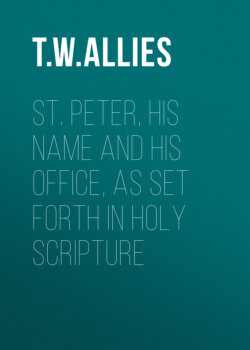| Division of the Acts into history of the Church universal, and of S. Paul |
| in particular | 114 |
| Gospels, history of the Head; Acts, of the Body | 115 |
| Execution of Christ's promises declaratory of their enactment | 116 |
| General proof of this as to the Primacy in the Acts | 117 |
| 1. Peter oftener mentioned than all the rest put together. |
| 2. The leading part assigned to him. |
| 3. Peter mentioned directly; the rest obliquely | 118 |
| 4. Peter answers for all the Apostles | 119 |
| 5. Luke records Peter's actions and speeches in full. |
| 6. The first part of the Acts may be called the history of Peter | 120 |
| I. Particular proof—Election of a new Apostle | 122 |
| S. Chrysostome's comment on this | 124 |
| Peter's conduct in defending the rest on the day of Pentecost | 125 |
| Third and fourth speech of Peter.—Summary of the first four chapters | 128 |
| II. Proof from junction of authoritative teaching and miracles | 129 |
| Resemblance between Peter's miracles and Christ's | 131 |
| Peter the chief figure among the Apostles as Christ before | 133 |
| III. Peter presides over the different steps in propagating the Church | 134 |
| Peter's part in the conversion of Samaria | 135 |
| IV. Peter receiving the Gentiles in the person of Cornelius | 137 |
| Things to be noted in this reception concerning Peter.—Peter murmured |
| against by some of the circumcision | 142 |
| S. Chrysostome and S. Gregory upon his conduct | 143 |
| V. S. Peter exercising supreme judicial power over Ananias | 144 |
| VI. S. Peter exercising supreme visitatorial power | 145 |
| VII. S. Peter's supreme legislative authority in council | 147 |
| The consent and joint action of others do not impugn the supremacy | 148 |
| Tertullian's testimony as to his authority here, and that of S. Jerome and |
| Theodoret | 150 |
| VIII. Contrast between the mode in which the imprisonment of Peter, |
| and that of James and Paul is mentioned | 151 |
| Summary of the testimony to Peter in the Acts | 153 |
| His Primacy magisterial, judicial, and legislative.—Its institution |
| compared with its exercise | 154 |
| No opposition offered to it | 155 |
| The mystical headship contrasted with the visible | 157 |
